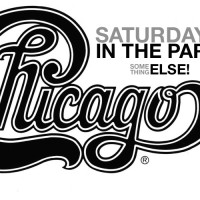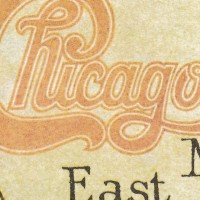Former Chicago drummer Danny Seraphine titled his autobiography after “Street Player,” the album-opening song from 1979’s Chicago 13 which he composed with writing partner David “Hawk” Wolinski. Keyboardist at the time for the soul-funk band Rufus, David was an old friend from the city of Chicago. The song tells of Danny’s childhood in a tough Italian neighborhood in the Windy City, and his escape from that life by his making it big with the band Chicago.
Chicago 13 again avoids the Roman numeral album titles that had, until recently, been standard practice with the group. The previous Hot Streets, their first without deceased lead guitarist/lead vocalist Terry Kath, was also the first exception. That uneven project proved there was at least some commercial potential left in Chicago. However, neither that album nor any of its singles cracked the Top 10, a comedown from the dizzying heights of their discography up until that point.
Some background is in order: According to Danny Seraphine’s memoir, Chicago was not initially signed to Columbia Records. James William Guercio, the band’s former manager and producer, was actually contracted to the label and leased Chicago’s recordings to Columbia. The band now had their own contract with the label. Seraphine never made it clear if adding lead guitarist/lead vocalist Donnie Dacus to fill Kath’s slot was a condition of signing with the label, but in any case, Chicago 13 is the band’s second and last album with Dacus.
Chicago had made no bones about the fact that Donnie Dacus did not mesh, and his over-the-top stage antics were not appreciated. Columbia, which seemed to have a man-crush on Donnie (they told him he was the new band leader) made sure that all but one single they released during his time with Chicago contained at least one lead vocal with their guy. Even on the song at hand, Dacus could clearly be heard on the outro:
“Street player, watch me move and I’ll make you groove
Yeah, yeah yeah! Whoo!”
To be honest, all the partying was taking a toll on the band, especially in the songwriting department. Many consider Chicago 13 the worst they ever made. I personally don’t feel that way, as some of the later albums in the 1980s are worse. Either way, Terry Kath’s genius is impossible to replace: His death robbed the band of its heart and soul.
“Street Player,” which I really love, begins with a snare hit from Danny and the horns kick in with a wicked figure, one of the most complicated, but satisfying we will hear from Chicago. Lead vocalist/bassist Peter Cetera passionately sings Seraphine’s autobiographical lyrics:
“Never forget those endless years
Street sound swirling through my mind”
Portions of the song were then looped by the Bucketheads for their huge hit, “The Bomb.” Many long-time fans were outraged because Chicago dared to release a funk/disco track. The Rolling Stones classic “Miss You,” from the previous year, boasted a similar feel, yet is mostly praised. Chicago “can’t get no satisfaction,” as usual.
Cetera’s rubbery bass bubbles along perfectly. The chorus changes tempo into more of a Latin feel as Dacus gets in some effective rhythmic fills. Peter’s voice reaches into the stratosphere with a falsetto (think the Bees Gees, without the annoying whine) and the horns are punchy. Guest artist Maynard Ferguson plays a screech trumpet solo that is something to behold.
The chorus repeats and a lengthy percussion section is next, courtesy of the band’s Laudir de Oliveira and Latin jazz great Airto Moreira. Keyboardist/lead vocalist Robert Lamm plays some jazzy piano chords and Dacus rips off one of his best solos. That ending tag mentioned above comes into play. Maynard comes back to wail with some impossibly high notes and we’re out.
A dance mix of the song was also released: This version begins with a timbale roll and a prominent synthesizer part not found on the original. The percussion is slightly more prominent on the dance mix as is the bass drum, which is really thudding on every beat. Danny’s high-hat is really pushed to the fore to get that disco vibe. The guitar solo is somewhat different, while retaining elements of the original. The percussion section is close to the original, but a new section with handclaps and a capella vocals and percussion ends things. Strangely, the dance mix is shorter than the nine-minute plus original by a minute.
In either mix, “Street Player” did not make much of an impact on the Hot 100. Chicago 13 only went gold, without any hit singles to boost it. The album contained only one ballad, which was not released as a single, probably because Donnie Dacus doesn’t have a lead vocal. Still, “Street Player” was an impressive beginning to an album that very quickly went down the dumpster.
Peter Cetera was carrying the band on his shoulders, something the original remaining members still touring with Chicago can’t stand, as they trash Peter at every opportunity. He sings almost everything on Chicago 13 except the Dacus features and Lamm’s one lead vocal. Make no mistake, this was a band in crisis: Their main songwriters were practically MIA and they had a new member they couldn’t stand.
Things actually got darker, but “Street Player” gave the ill-fated Chicago 13 a great lead-off track.
- Chicago, “Watching All the Colors” (2014): Saturdays in the Park - January 22, 2022
- Chicago, “Love Lives On” from ‘Chicago XXXVI: Now’ (2014): Saturdays in the Park - January 8, 2022
- Chicago, “More Will Be Revealed” from ‘Chicago XXXVI: Now’ (2014): Saturdays in the Park - December 11, 2021



